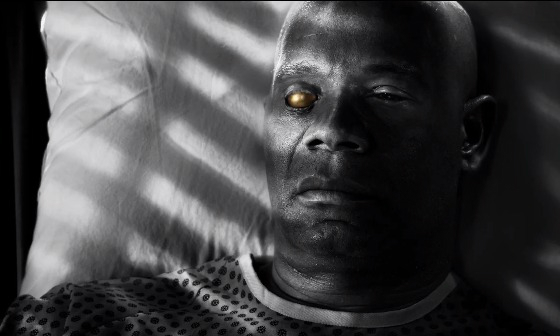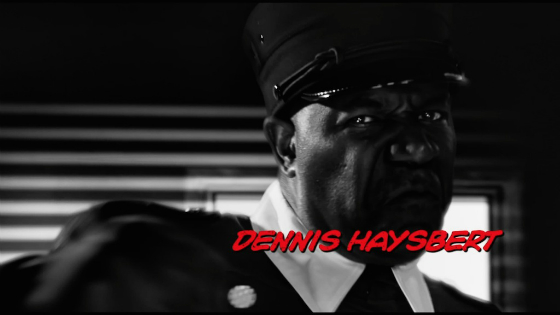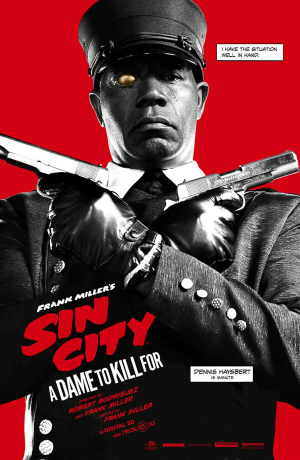EXCLUSIVE: Dennis Haysbert Talks Replacing Michael Clarke Duncan in Sin City 2
 |
In the cinematic sequel to Sin City, most of the all-star cast of the movie could be reassembled, but not in every case. Devon Aoki was too pregnant to repeat her role as Miho, Clive Owen’s Dwight needed a radically different face, and Michael Clarke Duncan didn’t live long enough to reprise his role as heavy handed enforcer Manute. In his place came Dennis Haysbert, who might not seem like the immovable object Duncan was – but based on our early screening, is likely to satisfy fans just as much. We spoke to him to get the skinny.
Luke Y. Thompson: I just figured out last night that this isn’t the first time that you and Michael Clarke Duncan have played the same comic book character. You were both Kilowog before.
Dennis Haysbert: Oh, yeah. He played the live action, and I played the animated version of it.
LYT: Did that come up at all in the casting process, that you guys have shared a role before?
DH: You know what? No, it didn’t. Not at all. I think they were looking for me to try to make this character my own. I hope I succeeded in that. I haven’t heard anything to the contrary, so I’m anxious to see my Manute on the big screen.
LYT: Oh, you haven’t seen it yet? It’s great.
DH: I’ve seen trailers and things that have been posted on my fan page and everything else, and it looks magnificent.
LYT: How much of it is movie magic to get you to his size, or are you just a lot taller than we perceive you to be?
DH: Oh, no. I’m playing my size. We didn’t alter anything physically to try to do a bigger Manute, or anything like that. Not at all. We just used me and my stature. We’ll see if it works. I think it will.
LYT: You’re also playing him a little before Michael Clarke Duncan did, so before he loses the eye, there’s a little bit more of a twinkle in his eyes than before he becomes just the big, scary dude. Was that a conscious decision on your part?
DH: You know, I just wanted to create my version of who Manute was, while also paying homage to what Michael Clarke did. I think it’s effective, and I think it’s going to create a lot of buzz. It’s going to be very interesting for the fans and the non-fans alike. I think I achieved the demeanor of Manute. It’s going to be really interesting. It’s going to be interesting to watch.
 |
| turntherightcorner.com |
LYT: Were you a fan of the comic books before?
DH: Yes, I was. Actually – not before. I didn’t know about it until I saw the first Sin City. But after watching the first Sin City, I got into it. It’s amazing. It’s almost like reading it, all these characters come to life right in the book. They kind of jump off the page at you. It’s really fascinating. And it’s very interesting about Manute – I think he dies in every version of all the different books, and comes back to life, which I think is very fascinating.
LYT: Yeah. Is it daunting when you get the call to fill in the shoes of such an iconic actor, or is it a challenge that you really want to dive into right away?
DH: Oh, it’s definitely a challenge. It’s something I embrace. Someone was going to have to do it, and I jumped at the opportunity. I wish Michael Clarke was still around, God bless his soul. But he’s not, and someone had to take over the role, and I’m very, very ecstatic that it was me.
Like I said, I pay homage to the character he created. He left a very strong and vibrant and relevant foundation, which I got a chance to build upon. You’ll find out more about Manute in this movie. The character is fleshed out a lot more, so it’s an exciting challenge, and one I embraced.
LYT: What’s the challenge like of being on a set where you don’t see the set at all?` Are you always with all the actors that we see you with onscreen? Are some of them added in later?
DH: No, no, we’re there, and what’s beautiful about the way that they film this is that you get to use all of your imagination. And also, the other kind of mundane things, they’re not in your way. So actually, you get to focus in on the other artists a little bit more. By the same token, you get to imagine what other things look like, and they just put them around you as your character creates that space. So you’re actually helping the scene drawers, and the scene drawers are helping you enhance your performance by what they dry in and around you. It’s a fascinating way to film movies, and one I like a lot.
 |
LYT: Do you feel like having done so much work as voice-over in cartoons gives you the edge up in imagining the world?
DH: You know what? It kind of does. When you’re doing an animated feature or an animated television show, there’s nothing in front of you but the script and an easel. There’s a little camera in the corner recording your actions and everything else, but you forget that that camera’s there, because it’s one of those little cameras that you used to put on your computer.
LYT: Yeah.
DH: Before computers had their own cameras built in. You forget about that, because it’s across the room, and you just have your mind and your imagination, and that’s the beauty of acting.
LYT: When you get in the big fight scene with Mickey Rourke, is that daunting in person? He seems like he’d be a really intimidating guy to go one-on-one against, even in a choreographed setting.
DH: Well, yeah, but I can be pretty intimidating too. [chuckles]Because we get to know each other off screen, it’s like a wonderful dance. It doesn’t take on that quality at all, except as the characters are going against one another. So it – no, I wasn’t intimidated at all, but I think excited, and willing to collaborate on a mental and physical level.
LYT: Speaking of collaboration, how is it being directed by both Robert [Rodriguez] and Frank [Miller]? How do they divide the work, and is there one who is more technical and one who is more about the thespian skills?
DH: I think they’re both equally adept at the physical, emotional and technical sides. They work seamlessly. There was never any conflict in one person’s directions or the others. It’s actually very symbiotic with each other, and it just worked seamlessly.
LYT: Looking over your resume, you’ve been in every ’80s TV show I ever watched, from Incredible Hulk to Magnum to Buck Rogers to A-Team.
DH: Oh, yeah. Those were the big shows at the time! Those were great. Great learning ground.
LYT: Was there one – I’m sure at the time you were just looking for the next paycheck, and work to work, but is there one you look back on particularly as being, “Yeah, I’m so glad I was part of that show, because it’s so iconic”?
DH: Well, you never knew if they were going to be iconic or not. I just loved the people that I was working with. All of the lead actors on there, especially – I can’t say one I like more than the other. I just have to say that I really enjoyed them all. Like I said, it was a great learning ground, and I took something away from every show that I did.
Working with the actors was just incredible. They were all incredible teams of actors. I’ve never really worked on a set where I have had any problems with anyone I worked with. It was always a joy to be on the set, and it’s one of those things. Being an actor, you love being on a set. I’m a workaholic in a business that’s not conducive to workaholics! Any time I can be on a set, however long I can be on that set, I’m in heaven.
LYT: Why do you say it’s not conducive to workaholics?
DH: Well, nobody works as much as they want to work.
LYT: Ah.
DH: You know? I mean, if you’re a workaholic in an office, you have an office job, you can always go into the office and work and create and do whatever it is you have to do in order to make that job better. But when you’re an actor, you’ve got to wait for the job to come, or create one, and then you’ve got to get the financing to do it, and then go on the set and do it. But writing takes time, getting productions together takes time, and sometimes you get the job, and sometimes you don’t. Sometimes there are great spaces between when you work. So that’s what I mean when I say that. I like to think that I’m always working, because I’m always working on myself, I’m always reading, I’m always out exercising, keeping my body and my mind and my spirit strong. But we all know that working is getting on that set, getting in front of that camera, hitting your mark and telling the truth, and playing. And playing, you know, and getting paid to play.
LYT: Would Allstate insure anybody in Sin City?
DH: [laughs]Only if they lied on their policy! [laughter]That’s a good question. I think they’d have to do a lot of creative work to get Allstate to insure them.
LYT: To cop a phrase, I think this role is in good hands, so thank you very much.
DH: Bless you, brother. I appreciate that.
—
SIN CITY: A DAME TO KILL FOR opens Aug. 22.
